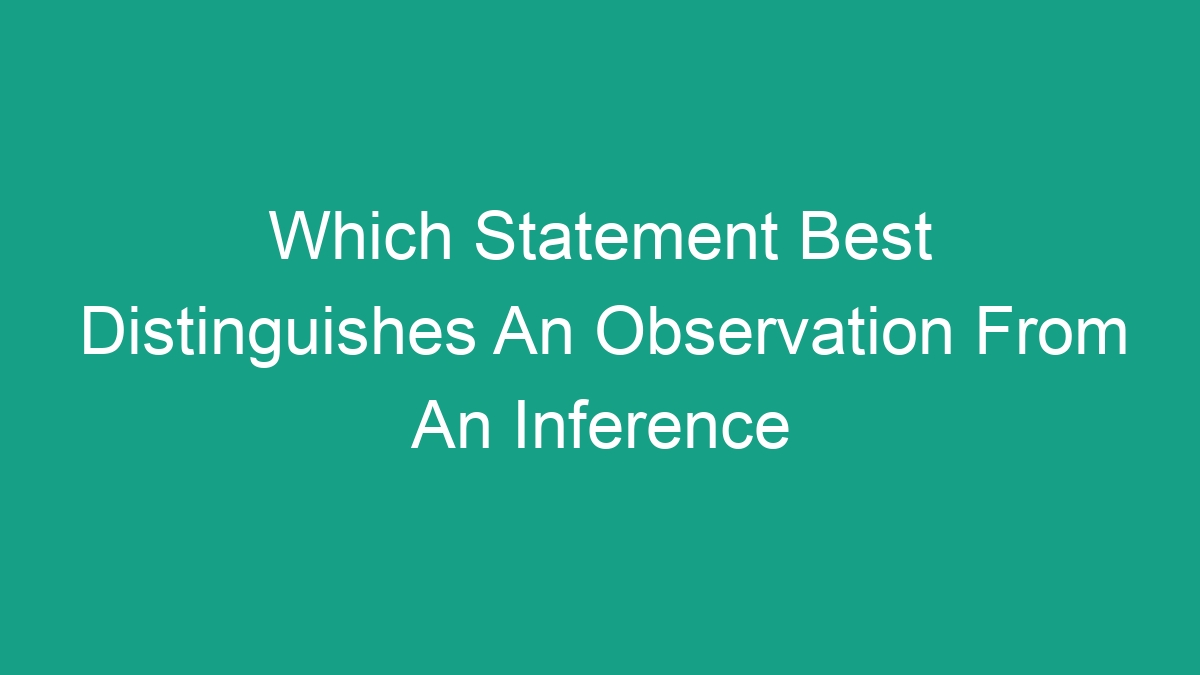
Understanding the Difference Between Observation and Inference
Observation and inference are two fundamental concepts in the field of science, critical thinking, and everyday life. While they are closely related, they are distinct processes with different characteristics and implications. In this article, we will explore the key differences between observation and inference and learn how to distinguish between the two.
Defining Observation
Observation is the act of closely perceiving or noticing objects or events using the senses or scientific instruments. It involves gathering data through sight, hearing, touch, taste, or smell. Observations are based on direct evidence and are considered factual and objective. In the scientific context, observations are used to collect data and establish the foundation for making inferences and drawing conclusions.
When making an observation, individuals simply report what they have witnessed without adding any interpretation or analysis. For example, if a person states, “The sky is blue,” they are providing an objective observation based on what they see.
Understanding Inference
An inference, on the other hand, is a conclusion or explanation that is drawn from observations. It involves interpreting or analyzing the data to make logical connections and create meaning. Unlike observations, inferences are subjective and rely on the individual’s interpretation of the information at hand.
Inferences are often used to make predictions, identify patterns, and form hypotheses. They are crucial for generating new knowledge and understanding the world around us. For instance, if a person sees dark clouds forming in the sky and infers that it will rain soon, they are using their interpretation of the observation to make a logical conclusion.
Distinguishing Between Observation and Inference
The best way to distinguish between observation and inference is by understanding the key characteristics of each process.
Observation:
– Based on direct evidence
– Factual and objective
– Involves using the senses or scientific instruments
– Does not involve interpretation or analysis
– Forms the basis for making inferences and drawing conclusions
Inference:
– Based on interpretation or analysis of observations
– Subjective and reliant on individual perspective
– Involves making logical connections and conclusions
– Used to generate new knowledge and understanding
It is important to note that both observations and inferences play crucial roles in the scientific method and everyday decision-making. While observations provide the raw data, inferences enable us to make sense of the world and make informed judgments.
Examples of Observation and Inference
To further illustrate the difference between observation and inference, let’s consider a few examples:
Observation:
– The thermometer reads 32 degrees Fahrenheit.
– The plant’s leaves are wilting.
– The student has a red mark on their paper.
In each of these examples, the statements are based on direct evidence gathered through the senses or scientific instruments. They are factual and do not involve any interpretation or analysis.
Inference:
– It will snow soon since the temperature is at freezing point.
– The plant needs water because wilting is a sign of dehydration.
– The student made a mistake in their work as indicated by the red mark.
These examples demonstrate how inferences are made based on the interpretation of observations. They involve drawing conclusions from the available data and making logical connections to form explanations or predictions.
The Importance of Distinguishing Between Observation and Inference
Understanding the difference between observation and inference is essential for several reasons:
Scientific Inquiry: In the scientific method, clear distinctions between observation and inference are crucial for conducting experiments, collecting data, and drawing conclusions. By accurately identifying observations and inferences, scientists can ensure the validity and reliability of their research findings.
Critical Thinking: Developing strong critical thinking skills requires the ability to differentiate between observations and inferences. This skill allows individuals to evaluate information, make logical judgments, and avoid jumping to unfounded conclusions.
Effective Communication: When conveying information, it is important to clearly differentiate between observations and inferences. This ensures that the intended message is accurately conveyed and reduces the risk of misinterpretation.
Tools for Enhancing Observation and Inference Skills
Improving one’s ability to make accurate observations and logical inferences is a valuable skill that can be developed through practice and awareness. Here are some tools and strategies for enhancing observation and inference skills:
Active Listening and Observation: Paying close attention to details and actively engaging with the environment can enhance observational skills. Taking note of subtle cues and patterns can provide valuable data for making informed inferences.
Questioning and Curiosity: Asking critical questions and seeking to understand the underlying reasons for observations can improve inference skills. Cultivating curiosity and a desire for deeper understanding encourages the development of logical reasoning and inference capabilities.
Logical Reasoning Exercises: Engaging in activities that require logical reasoning, such as puzzles, riddles, and analytical games, can help strengthen the ability to make sound inferences from observations.
Practical Applications: Applying observation and inference skills in real-life scenarios, such as problem-solving, decision-making, and scientific investigations, provides practical experience and enhances proficiency in both processes.
Conclusion
In summary, observations are factual, objective data gathered through the senses or scientific instruments, while inferences are subjective conclusions drawn from the interpretation or analysis of observations. Distinguishing between observation and inference is critical for scientific inquiry, critical thinking, and effective communication. By honing observation and inference skills, individuals can make informed judgments, draw logical conclusions, and contribute to the advancement of knowledge and understanding.



